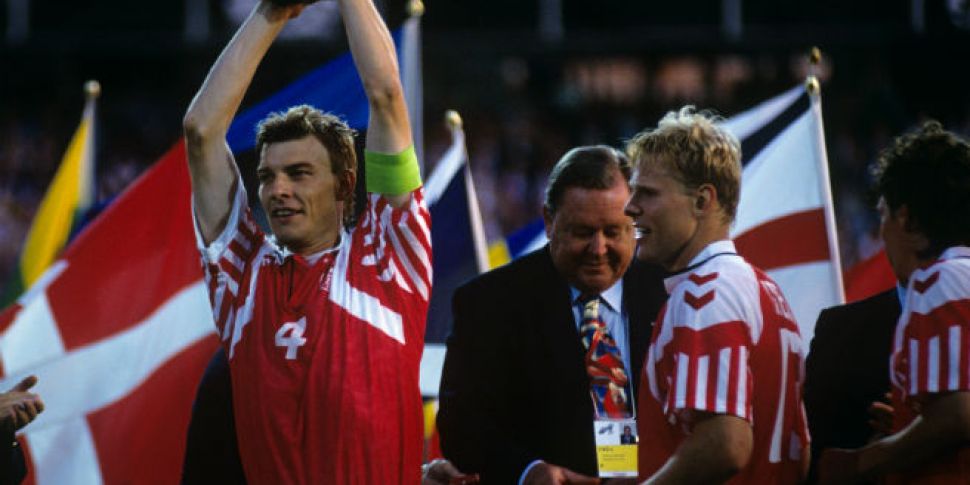While Leicester City captured the imagination of football fans around Europe, many were quick to label their success a modern day fairytale.
Few can argue with such a label when you consider the sheer determination and sacrifice it would take to tumble the money rich clubs of the Premier League.
However, if you cast your mind back a little over two decades you can find yourself immersed in one of the original footballing fairytales.
In the shadow of the great Danish sides of the 1980s, Richard Moller Nielsen did the unthinkable and did what his predecessors could never do: win the European Championship.
As with every fairytale, the protagonists came from rather inauspicious beginnings.
To give some context, the Danish side of the 1980s were on the cusp of becoming a superpower of international football. Despite their small population, similar to that of Ireland, German coach Sepp Piontek, through a mixture of discipline and tactical nuance, developed one of the most talented national sides the world had ever seen.
Bobby Robson referred to them as "one of the best teams I have seen in the last ten or 15 years" before facing them in a European Championship qualifier at Wembley in 1983.
A throw away comment, perhaps, but in real terms to factor in such years would compare them to the Dutch side who pioneered Total Football or further back again to what many would describe as the finest international side of all in time, in the Brazilians of 1970.
The "Danish Dynamite" as it were, played without fear or expectation. Rob Smyth and Lars Eriksen write in their wonderful testament, of the same name, to that almost all-conquering team, that the attitude before the switch to wholesale professionalism was aptly summed up by Danish-Norwegian author, Aksel Sandemose.
He explored a social phenomenon among Scandinavian countries called the Law of Jante. The Law, which was a summation of ten rules, carried the message that the individual should not put themselves before the collective.
Furthermore, that people would not think of themselves as special, a concept even to this day that some Scandinavian countries find hard to shake. "Du Skal Ikke Tro At Du Er Noget" — "You Should Not Believe That You Are Something".
In any case, the Danish side of the 1980s benefited from the lack of expectation coupled with the newfound confidence and discipline that Piontek had instilled in them.
Despite a team packed with some of Europe's top players, they made it only as far as the semi-finals in 1984, losing out to Spain on penalties.
Euro 1988 offered little redemption, they finished bottom of their group with no points from three games.
Danish supporters, "Roligans" as they were known, however, saw for the first time how talented their national side had become and how capable they were of greatness.
The spring of 1992 offered little solace for their supporters, they failed to make it through the qualifying stages for that summer’s competition in neighbouring Sweden.
Instead of packing their suitcases for the tournament, Nielsen was actually in the middle of some home renovation. A new kitchen had taken precedence for a man on the brink of losing his job as the national team’s coach.
Had it not been for the civil unrest in Yugoslavia, it is probably fair to say the Nielsen would have been out of a job.
Denmark had missed out on qualification through the group stages and endured a public falling-out with the country’s most talented player, Michael Laudrup.
He refused to play under Nielsen, because he felt the team had no place for his style of football. The style the manager had implemented was a far cry from the free flowing football of the 1980s and had cast away with the Danish twist on Total Football (alternative 3-5-2 formation) which has endeared so many in the decade previous.

The alternative 3-5-2 formation the Danes employed. Image: LineupBuilder
Nielsen instead opted for a more defensive approach to the game, frustrated that his side were playing attractive football but had nothing to show for it.
He used strikers Flemming Povlsen and Kim Vilfort as target men to win headers and lay the ball off to more attack minded midfielders in Henrik Larsen and Brian Laudrup.
In this was way the side had opted for more of a long ball approach at points, rather than the patient passing play of their predecessors.
This wasn't for a lack of quality either. Ten of the players in the squad either played for or had previously played for Danish super club Brondby.
A year before the Euros, Brondby had got to the semi-finals of the Uefa Cup.
Denmark were supplemented to the eight team tournament when Yugoslavia, in a state of civil, were removed from consideration.
They found themselves in a group with France, hosts Sweden and England, having been accepted to play on only ten day’s notice.
"There were those who didn't believe we would be included, but we were aware of small talk that this could be the situation” Vilfort told the BBC.
"Then we got the news. There was no discussion. Denmark had to participate in the tournament. It wasn't possible to say 'no' because it would not have helped the relationship between Uefa and the Danish Football Association.
"But we had a good team. We'd beaten Yugoslavia in the group stages and had been scheduled to play the CIS [team of former Soviet Union states] the week before the start of the competition."
A scoreless draw with England in the campaign opener was followed by defeat to Sweden.
They still had a chance at qualification heading into the final game against a French side who boasted the talent of Didier Deschamps, Laurent Blanc and the enigmatic Eric Cantona.
The French had made history in the build-up to the campaign by becoming the first team to win all eight qualifying games.
Goals from Henrik Larsen and substitute Lars Elstrup guided them through to the semi-final of the competition where they would go on to face the tournament favourites, the Netherlands.
Before the beginning of the competition the New York Times wrote: Van Basten's own striking edge has more of the 1988 honing than its 1990 dullness. Gullit is fitter now, and Frank Rijkaard, "the poet footballer," is eager once more. Ron Koeman may be slow in defense, but has awesome power in his left foot. And young Ajax forwards Dennis Bergkamp and Bryan Roy are bursting into flower.
This was a team full of experience and as Marco van Basten had put it; "Virtually everybody on our squad has won something this year with their clubs.."
It was a tall order for the Danish. Their style was the antithesis of how the Dutch played football.
Larsen handed them an unlikely lead after just five minutes and scored again just ten minutes after Denis Bergkamp’s equaliser.
It looked as though regular time would be enough to see them through to an unprecedented final, but Frank Rijkaard forced extra time with an 86th minute strike.
The Danes fought bravely for the additional 30 minutes, forcing their Dutch counterparts to the penalty shootout.
"I always make my mind up before" said Danish goalkeeper, Peter Schmeichel.
"I wanted to make sure that I had everything in me to try and get there. So I made up my mind, I didn’t know exactly how I did it, but I did it.
"The first one I was going to go left, then I was going to go left and then I’d go three right. I stuck by that, I didn’t even look at who was taking the kicks."
It was with this unorthodox system Schmeichel would go down in Danish folklore. He denied Marco van Basten during the penalty shootout and was enough to grant them safe passage to the next round.
"He gives everybody on the team confidence," Denmark's manager, Richard Moller Nielsen, said of Schmeichel.
"He showed everybody today he is one of the best goalkeepers in the world."
In the final they would meet Germany. The defending world champions.The final hurdle in a remarkable European Championships.
And why should they fear the Germans? They had overcome the tournaments three best team each time of asking.
Schmeichel was once again to thank as he denied Jurgen Klinsmann on occasions, before John Jensen gave the Danes the lead on 18 minutes. With that came the belief. If they were still lacking it after victories over France and the Netherlands, they certainly had it now.
Kim Vilfort secured the remarkable victory with a second half goal after some ferocious defending over the course of the game. Their approach to the match may have made it less of a spectacle, but the result was nothing short of remarkable.
Nielsen liberated the team from the idea they were nothing special (“Du Skal Ikke Tro At Du Er Noget” — "You Should Not Believe That You Are Something") and challenged them to dream.
A run which featured some of the most remarkable results in the competition’s history and a team which overcame all the odds to topple the traditional footballing superpowers, it’s easy to deem Denmark’s success at Euro 1992 as a fairytale.
Download the brand new OffTheBall App in the Play Store & App Store right now! We've got you covered!
Subscribe to OffTheBall's YouTube channel for more videos, like us on Facebook or follow us on Twitter for the latest sporting news and content.








